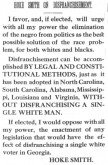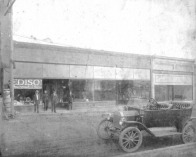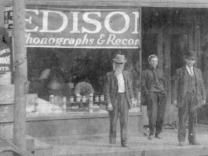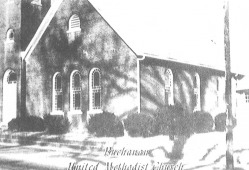Buchanan Timeline
1903-1909
______________________________________________________________________________________
|
1903
|
Mayor Dr. J.T. Cobb
|
_______________________________________________________________________________________
|
Feb 1903
|
Tests in Buchanan have proved the worthiness of the first road-working machines in the county. Ordinary Tom Hutcheson plans to work on actual roads in a few weeks. These machines are financed by the Alternative Road Law, which permits conscripted (non-exempt) males, aged 16-50 and living outside incorporated towns, to avoid a 3-day biannual road duty by paying $1.50 instead. The Tribune offers the following opinion this month: [President Theodore] Roosevelt is lauded by the negro incendiaries of the country and despised by the decent white people of the south. It is a fitting estimate of the man. Last December, the paper had published a letter from Roosevelt to a prominent citizen of Charleston, SC concerning the appointment of Dr. Crum as collector of the port there. Roosevelt had written:
...you add, as a further reason for opposition to him, that he is a colored man, and, after reciting the misdeeds that followed carpet bag rule and negro domination in South Carolina, you say that "we have sworn never again to submit to the rule of the African, and such an appointment as that of Dr. Crum to such office forces us to protest unanimously against this insult to the white blood." ...At the time of my visit to Charleston last spring I had made, and since that time I have made, a number of such appointments from several states in which there is a considerable colored population. For example, I made one... in Mississippi, and another in Alabama... I had... appointed... two colored men as judicial magistrates in the District of Columbia... I have recently announced another such appointment for New Orleans, and have just made one for Pennsylvania... The great majority of my appointments in every state have been of white men. North and south alike, it has been my endeavor to appoint only men of high character and good capacity, whether white or black. I do not intend to appoint any unfit man to office... but I cannot consent to take the position that the door of hope -- the door of opportunity -- is to be shut upon any man, no matter how worthy, purely upon the grounds of race and color. |
_______________________________________________________________________________________
|
Mar 1903
|
An anonymous person asks in the local newspaper: Why don't [sic.] Buchanan have a small library? One can be secured without much cost, and it would be a lasting benefit to the town and community.
|
________________________________________________________________________________________
|
Aug 1903
|
This month an issue of The Tribune contains an article about prominent civic men and firms in Buchanan, whose accomplishments are lauded. This includes Thomas A. Hutcheson, business partner in "the firm of Smith & Hutcheson, cotton ginners and grist mill men, the capacity of whose gin exceeds forty bales of cotton daily", and Ordinary of Haralson County for the best part of a decade; Wilson P. Howell, just this year clerk of the Superior Court, recorder of county business and custodian of the county's property, such as the courthouse (today's Historic Courthouse) and its belongings; T.R. Mothershed, storekeeper and charcoal manufacturer; H.D. Lasseter, the store where "you can get anything you want or need from a jack-knife to a traction engine"; The Loveless House, a hotel managed by Mr. A. C. Auchmuty, valued because "(o)utside of a newspaper, nothing advertises a town or city as much as a first-class hotel"; and finally, Eaves & Sons, a dry goods and grocery establishment, with "no individual or corporate concern (standing) more prominently before the public."
|
________________________________________________________________________________________
|
Sept 1903
|
For women with money who think their hair is too "curly", an ad in the local newspaper promises chemical relief for $0.25. In an age when paper money did not come in small enough denominations, the ad solicits payment for a mail order by means of postal stamps. The dark-complexioned woman in the ad provokes us to remark that in 1903, while among whites, basic literacy of those over 14yo was enjoyed by well over nine-in-ten, among non-whites, over two-in-five remained illiterate, although this was down from four-in-five in 1870. (Before the Civil War, white illiteracy in the South had been over twice that in the North, and in 1903 it was probably still less likely for a Southener than a Northerner to believe in the advantages of mass education.) That colored illiteracy could not be attributed (at least alone) to disinterest or inability, the brutal resistance of whites to colored education had been documented a half-century earlier in A Key to Uncle Tom's Cabin (1853) by Harriet Beecher Stowe:
Page 111 "...But in America the laws, throughout all the slave states, most rigorously forbid, in the first place, the education of the slave. We do not profess to give all these laws, but a few striking specimens may be presented. Our authority is Judge Stroud's "Sketch of the Laws of Slavery." The legislature of South Carolina, in 1740, enounced the following preamble: -- [citation made -RF] "Whereas, the having of slaves taught to write, or suffering them to be employed in writing, may be attended with great inconveniences;" and enacted that the crime of teaching a slave to write, or of employing a slave as a scribe, should be punished by a fine of one hundred pounds, current money. If the reader will turn now to the infamous "protective" statute, enacted by the same legislature, in the same year, he will find that the same penalty has been appointed for the cutting out of the tongue, putting out of the eye, cruel scalding, &c., of any slave, as for the offence of teaching him to write! That is to say, that to teach him to write, and to put out his eyes, are to be regarded as equally reprehensible. That there might be no doubt of the "great and fundamental policy" of the state, and that there might be full security against the "great inconveniences" of "having of slaves taught to write," it was enacted, in 1800, [citation made -RF] "That assemblies of slaves, free negroes, &c * * * * for the purpose of mental instruction, in a confined or secret place, &c., &c., is [are] declared to be an unlawful meeting;" and the officers are required to enter such confined places, and disperse the "unlawful assemblage," inflicting, at their discretion, "such corporal punishment, not exceeding twenty lashes, upon such slaves, free negroes, &c., as they may judge necessary for deterring them them from the like unlawful assemblage in future." ...The offence of teaching a slave to write was early punished, in Georgia, as in South Carolina, by a pecuniary fine. But the city of Savannah seems to have found this penalty insufficient to protect it from "great inconveniences," and we learn, by a quotation in the work of Judge Stroud from a number of "The Portfolio," that [citation made -RF] "the city has passed an ordinance, by which any person that teaches any person of color, slave or free, to read or write, or causes such person to be so taught, is subject to a fine of thirty dollars for each offence; and every person of color who shall keep a school, to teach reading or writing, is subject to a fine of thirty dollars, or to be imprisoned ten days, and whipped thirty-nine lashes." |
________________________________________________________________________________________
|
Oct 1903
|
The Smith & Hutcheson cotton ginnery advertises in the Buchanan newspaper. In another issue the paper remarks that "(s)ome localities in Georgia are refusing to allow strange negroes to locate in them unless the negroes bring recommendations of good moral character with them. Most of the fiendish crimes committed by negroes has [sic] been done by those who are idly drifting around the country without places of permanent abode and who have no good object to subserveby shifting about."
As one could expect, the paper has nothing to say about strange whites who may be drifters and whether one might also impose upon them the written-pass etiquette reminiscent of that applied to ambulatory negros in the antebellum era. One should remember that there is nothing like radio or television for an illiterate person to learn about things indirectly - like work and other opportunities for betterment - and idle word of mouth is no more accurate then than it is now. Even nine decades later, just before the mass-market Internet revolution, despite diligent literary and electronic preliminary investigation, this writer found it essential to mobilize to Haralson County for a great many weeks to locate and close the purchase on land he would homestead. What does a poor and illiterate person a century ago do when there is no local opportunity to earn a living or there is unchecked danger from neighbors? He probably does what many Americans of all colors, illiterate and not, would do even a generation after this newspaper item appeared - hit the road in hopes of something better elsewhere. |
________________________________________________________________________________________
|
1904
|
________________________________________________________________________________________
|
1905
|
Mayor E.S Griffith
Mayor Pro Tem S.O. Smith |
________________________________________________________________________________________
|
Jan 1906
|
The local newspaper observes that: Yesterday three out-of-town parties [wrote] to this office inquiring for homes. These gentlemen are... willing to pay reasonable prices... Not a home is on the market today in Buchanan, neither is there a home to rent, and the demand continues to grow daily. A newspaper ad advertises: beautiful, Top Buggy... fine Leather Quarter Top... Spring Bottom Cushion, and Leather Back, is Elegantly Painted It costs $49.00. $4.90 more buys a fine Collar and Hame harness... regular retail price $12.50. Another ad, for Moore Bros. in Buchanan, offers: Ladies' shoes from 75c to $3.00. Men's shoes from $1.00 to $4.00.
On a Sunday, just after midnight, a fire does several hundred dollars damage to Eaves & Sons' large dry goods establishment on the east side of the public square, and for a few minutes it seemed that the entire block was doomed to destruction by the angry flames. Thirty-four years later, the building will not be as lucky. |
________________________________________________________________________________________
|
Jun 1906
|
Buchanan's newspaper The Tribune writes that The white people, the great majority of them in Haralson... will refuse to be divided by designing politicians who know that they could not hope to get a nomination in a non-partisan white primary... Dr. E.B. Hutcheson, chairman of the republican executive committee of Haralson County.. has said that the word 'white' as used in connection with the primary ordered to be held on the 14th of July is nauseating to him...
|
________________________________________________________________________________________
|
Aug 1906
|
|
________________________________________________________________________________________
|
Sept 1906
|
The so-called "white primary" was a mechanism to evade the 15th Amendment to the US Constitution. Serious legal resistance to it only began in the 1920's, and not until 1944 did the US Supreme Court declare it unconstitutional and the work of dismantling it begin. In Haralson County it was proposed by the Democratic Party and acceptance by the People's Party ("Populists") assured its success. In Buchanan this month, The Tribune editorializes so: The candidates in this campaign, on both sides, are gentlemen, so far as we know, but it is what they stand for that the people must pass upon. ...Every white voter who is willing to vote for the safety of his home, his wife and his daughters, will vote for white supremacy, and in Haralson county it means that he will vote for the white primary nominees, because political equality for the negro, ultimately means that he will construe it as social equality, which the white people will never tolerate, and the result is rape, burglary, larceny, riot and lynchings... White men, settle these grave questions at the ballot box by always voting for white supremacy.
Also this month the infamous Atlanta Race Riot of 1906, greatly damages the city's "New South" image when white mobs kill dozens of blacks. |
________________________________________________________________________________________
|
Oct 1906
|
This month The Tribune wrote under the subtitle White Primary Plan Firmly Established in Haralson County the following: The election passed... it was a forgone conclusion from the very start that the ticket nominated in the white primary on July 14 would be successful... The upbuilding of Haralson county should be the chief aim of all our people. Discord breeds hatred and destruction, and to buy votes and use liquor at elections tend to destroy our morals. The people of Georgia have spoken in no uncertain terms that they are tired of the negro in politics...
|
________________________________________________________________________________________
|
Nov 1906
|
This month an issue of The Tribune contains "infomercials" about very many Buchanan merchants; a cotton gin firm offers to gin for $0.30 per hundred pounds of lint. A sales ad in the paper this month relates the following: Sugar costs $1.00 for 20 lbs. A bushel of corn is $0.75, while $0.90 gets you 50 pounds of flour. A pound of meat is $0.10 and a pound of Sweep Stakes Tobacco is $0.30. Another ad that month says the latest high-tech consumer gadget is Good enough to satisfy experienced photographers, yet so simple that children can use it. This No 2. Folding [Kodak] Brownie camera costs $5.00 and even Loads in daylight with film Cartridges, making pictures 2.25"x3.25" Also this month, the paper reprints an Augusta Tribune editorial which begins... It is very possible that the historians of the future and posterity generally will place Abraham Lincoln as the wisest, best and greatest of our line of presidents to this date. The item goes on to praise Lincoln as an heir to Jefferson and takes note of his expressed skepticism that whites will accept blacks as equals.
|
_______________________________________________________________________________________
|
1906
|
Mayor Joel Phillips. Below (at left), you'll find an undated photograph of the eastern side of the Square, showing four men (left to right): Joel Phillips, Mr. Sanders(?), Jos. A. Rowell, and Grady Richardson(?) Mr. Phillips and son-in-law Rowell probably owned the phonograph shop in front of which they are standing; it later went bankrupt, according to Phillips grandson H. P. Griffith. Also pictured below (at right) is a cropped version of this photograph, providing a better view of the shop and the three men on the left.
Clicking the images will display their full-sized versions in a new window. |
________________________________________________________________________________________
|
Jan 1907
|
Mayor Joel Phillips reports that for the year 1906 the amount of taxable property was $131,800.00. The 6 mills tax raises $790.86. The railroad tax brings in another $114.97, while the telephone tax renders $0.43. With the $1.05 tax from the Southern Express Company, these tax sources for 1906 total $907.31. Estimating the city population of 1906 as 421, that comes to $2.16 per capita. An additional entry of $191.00 is made for "street taxes". With 36 cases tried during the year assessing $172.50 in fines, and costs coming to $57.80, the Mayor's Court raises an additional $114.70.
|
________________________________________________________________________________________
|
1907
|
Mayor J.S. Edwards
|
________________________________________________________________________________________
|
Mar 1907
|
In the local newspaper, a letter-writer quotes statistics saying southeast US farmers haul average loads of 1,702 pounds to market, at a cost of $0.16 per hundred pounds, and argues for the economic advantages of better roads. An ad by an Atlanta Bank argues for telecommunication-based finance in this modern age, arguing that Banking by mail is no experiment but a tried success.
|
________________________________________________________________________________________
|
Apr 1907
|
S. D. C?emean compares Haralson County in 1907 to itself in 1893 in a letter to Buchanan's The Tribune, noting vast improvements. Cotton has climbed from 4+1/8 cents to 10 or even 12 cents per pound and Roads that were almost impassable for an ox cart... are now being tracked by automobiles.
|
________________________________________________________________________________________
|
Jun 1907
|
A local newspaper ad from the Georgia School of Technology (now Georgia Tech) notes that 15 free scholarships are assigned to each county in Georgia.
|
________________________________________________________________________________________
|
Aug 1907
|
A full-page Buchanan newspaper ad announces a Big MID-Summer Clearance Sale, offering men's suits worth $8-$15 marked down to $5-$9.50 as well as Shirts for young men, old men and boys, 50 to 75c values, Sale price 48c and Underwear - both long and short Drawers.. Sale Price 48c
_ _ _ Buchanan High School enrollment reaches 246, a month into the new term. Land totalling 255 acres, 1.25 miles south of the city, is offered up for sale at $6.50 to $7 per acre. |
________________________________________________________________________________________
|
Sep 1907
|
Popular and historically important County Ordinary, Judge Thomas A. ("Tom") Hutcheson, calls on people to take part in an all-day song service at the Haralson County courthouse.
|
________________________________________________________________________________________
|
Oct 1907
|
Buchanan Lecture Association sponsors free lecture by Trustee Board Chairman N. E. Harris of the Technological School (now Georgia Tech) at the Haralson County courthouse. A newspaper letter by Buchanan High School's principal, A. H. Moon, promotes this as the first of many lectures to span the fall and winter months.
|
________________________________________________________________________________________
|
Dec 1907
|
Buchanan High School defeats Dallas High School in debate held in the Haralson County courthouse on issue of compulsory school attendance by children 6-14. In April, Buchanan High had beaten Hamilton College in debate on its home turf in Bremen.
_ _ _ Buchanan 50th anniversary |
________________________________________________________________________________________
|
Jan 1908
|
Georgia alcohol prohibition comes into effect
|
________________________________________________________________________________________
|
Mar 1908
|
State College of Ag educational railroad train lays over in City; lectures, exhibits and free circulars provided to farmers.
|
________________________________________________________________________________________
|
Aug 1908
|
Buchanan city incorporation amended on the 17th. Jail terms of up to 60 days may now be imposed, and convictions in Mayor's Court can now be appealed to the Superior court of Haralson county. The city can punish people for gambling and suppress rowdy and disorderly houses, houses of ill-fame. The city may now operate a water supply, a sewer system, and sell gas or electric lighting and electric power to people in the city.
Tax increases require approval of two-thirds of the voters in an election. The city gains the power to collect a special license tax from any person, firm or corporation, or agent thereof, engaged in carrying on either temporarily or permanently, or who shall offer to so carry on or engage in, any business, profession or calling of any kind or character within the corporate limits... |
________________________________________________________________________________________
________________________________________________________________________________________
|
May 1909
|
This month the Atlanta Constitution reports 34 PERSONS KILLED IN GEORGIA / Tornadoes Work North and South PROBABLY 100 OTHERS INJURED / THIRTEEN KILLED BY CYCLONE AT BUCHANAN
|
________________________________________________________________________________________
|
1909
|
The Sanford-Wade Heritage House built diagonally opposite the northwest corner of the courthouse, and immediately opposite the Methodist Church.
|
Proudly powered by Weebly



